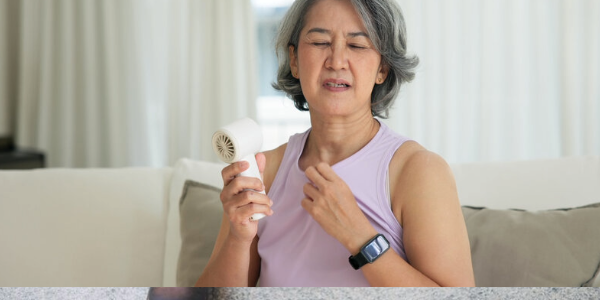Early menopause is described as a life-changing diagnosis with profound physical, psychological, and social consequences. Affected women suffer not only from the effects of estrogen deficiency, but also from the unexpected loss of their reproductive capacity. However, some women are more affected by these changes than others. A new study helps to explore the reasons for these differences. The results were published in Menopause, the journal of the Menopause Society.
How Early Menopause and Depression are Linked
Early menopause, medically known as premature or primary ovarian failure (POI), is a condition in which the ovaries stop functioning normally before the age of 40. It is associated with an increased lifetime risk of depression and anxiety. A recent meta-analysis found an odds ratio of 3.3 for depression and 4.9 for anxiety in women with POI compared to women without the condition. The increased risk is understandable given the additional experience of infertility and the further stresses of estrogen deficiency, such as hot flashes, vaginal dryness, decreased bone mineral density, and an increased risk of cardiovascular disease, among other things. For some women, infertility means changed life goals, loss of control, and often even social stigma.
However, not all women suffer from depression or the same degree of depression when they receive the same diagnosis. In this new study, researchers collected data from nearly 350 women with POI to identify the specific variables that contribute to the likelihood of depressive symptoms. Their first observation was the high prevalence of depression among the participants. Nearly one-third (29.9%) of women with POI suffered from depressive symptoms. The researchers also found that younger age at POI diagnosis, severe menopausal symptoms, grief over the loss of fertility, and lack of emotional support were risk factors. No significant difference was found between the depressive symptoms of women receiving estrogen-progestogen therapy and those who did not undergo hormone therapy, underscoring the role of psychosocial factors.
Interestingly, a genetic cause of POI was associated with lower depressive symptoms. Another unexpected finding was that although greater distress from menopausal symptoms was independently associated with depressive symptoms, hot flashes (especially night sweats) were not. This is the first known large-scale study to examine specific variables associated with depressive symptoms in women with POI. The researchers believe that the findings highlight the importance of comprehensive care that addresses both the physical and psychological aspects of menopause at an early age.
Regular Check-Ups are Important
The survey results are published in the article “Depressive symptoms in women with premature ovarian insufficiency (POI): a cross-sectional observational study.” The high prevalence of depressive symptoms in women with POI underscores the importance of routine screening in this vulnerable population. Although hormone therapy is recognized as the standard treatment for women with POI to alleviate some menopausal symptoms and prevent depression, it is not a first-line treatment for affective disorders. This was evident in this study, which found no difference in depressive symptoms between those taking hormones and women who did not receive hormone therapy. Treatment of behavioral disorders with evidence-based interventions should be part of any comprehensive POI treatment plan,” said Dr. Monica Christmas, associate medical director of the Menopause Society.






